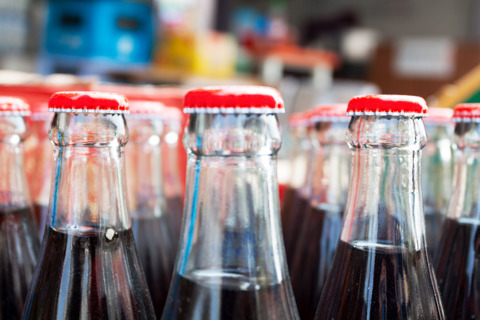
Sugar tax could help young people reduce risk of type 2 diabetes
Young people are predicted to benefit the most from a proposed “sugar tax,” according to researchers who have found that the impact of drinking less sugary drinks could reduce their chances of developing type 2 diabetes.
The government sugar tax is set to be introduced in the UK in 2018 in a bid to tackle the growing obesity problem.
Researchers from a number of institutions, including the University of Oxford and the University of Cambridge School of Clinical Medicine, held tests to estimate what the impact of the tax on drinks high in sugary content could have on health.
Cutting down on sugary soft drinks can help reduce the risk of obesity and type 2 diabetes
Their findings, recently published in The Lancet, showed that the maximum health benefits would be seen if products were changed to contain less sugar. This option was estimated to help reduce obesity cases in the UK by around 150,000 per year, as well as reducing cases of tooth decay by 250,000. In addition the study forecast fewer new cases of type 2 diabetes being diagnosed, and fewer decayed, missing, or filled teeth each year.
The researchers said: “The greatest benefit for obesity and oral health would be among individuals aged younger than 18 years, with people aged older than 65 years having the largest absolute decreases in [type 2] diabetes incidence.”
The researchers aimed to assess the health effects of the proposed sugar tax for soft drinks on conditions like obesity, type 2 diabetes and dental health. The study looked at three different possible outcomes the tax could have - where a high tax would be placed on high-sugar drinks containing more than 8g of sugar per 100ml; a moderate tax for mid-sugar drinks with 5-8g; and no tax for low-sugar drinks with less than 5g per 100ml.
For each of the scenarios a best and worst case scenario was modelled. The best case scenario assumed a 30% reduction in sugar concentration in high-sugar drinks and 15% reduction in mid-sugar drinks. The worst case scenario assumed a 5% reduction in sugar concentration of drinks with a high and medium amount of sugar in them.

The researchers added: “The health impact of the soft drinks levy is dependent on its implementation by industry. Uncertainty exists as to how industry will react and about estimation of health outcomes. Health gains could be maximised by substantial product reformulation, with additional benefits possible if the levy is passed on to purchasers through raising of the price of high-sugar and mid-sugar drinks and activities to increase the market share of low-sugar products.”
An NHS Behind the Headlines report on the study concluded: “It would make sense that these measures would result in positive health effects. However, this is only a modelling study, and while the researchers have attempted to make these estimates as true to life as possible, they cannot be completely accurate. Sugar-sweetened beverages, though commonly consumed by children and young people, are only one source of sugar. If sugar is still being consumed in high amounts through confectionery, baked goods, in ready-made meals and sauces, or added sugar to food and drinks, then this may not have such great effect.
“Current recommendations are that free sugars should not exceed 5% of our total dietary energy intake. This applies to all age groups from two years upwards.
“In real terms, this means: no more than 19g a day of free sugars for children aged four to six; no more than 24g a day for seven to 10-year-olds; no more than 30g a day for children from age 11 and adults”
The recently published draft legislation of the soft drink industry levy included plans for the tax to be introduced in April 2018, giving sellers of soft drinks time to reduce sugar in their products.
It is estimated that around £530 million could be raised - the equivalent of around 18-24p per litre of soft drink.
The Government said money raised from the tax will be spent on primary school sports in England, with the devolved administrations in Scotland, Wales and Northern Ireland free to decide how to spend their share.
Read the report in The Lancet
Find out more about type 2 diabetes
Support DRWF by making a donation here
Find out more about DRWF-funded research here
Find out more about DRWF fundraising here
For latest update follow DRWF on Facebook, Instagram and Twitter
To receive the charity’s latest bulletins as they become available, please sign up here
Read DRWF diabetes information leaflets here
I would like to make a regular donation of
I would like to make a single donation of
There are lots of ways to raise money to support
people living with all forms of diabetes.
Bake, Swim, Cycle, Fly ... Do It For DRWF!
Fundraise with us
Recent News


